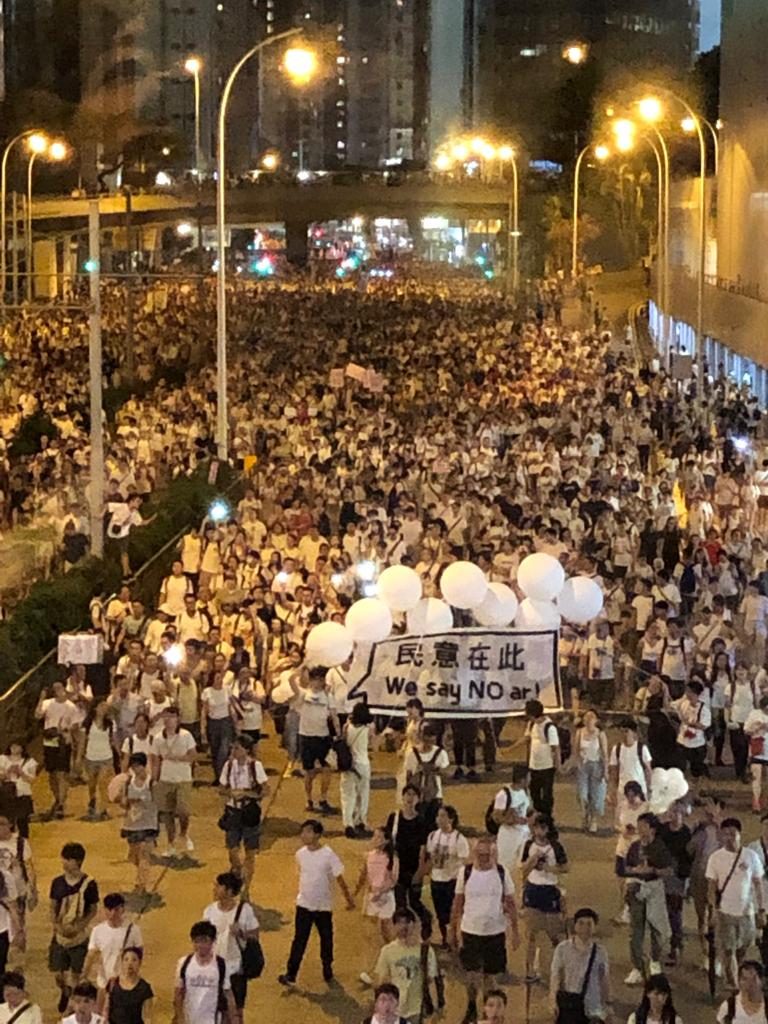When we decided to spend May in Hong Kong and China and shared our reflections about May being the month in between 2 very important historical anniversaries (“It’s the month of May … in a Year of Political Anniversaries”), we could never have imagined that a mass protest in Hong Kong would make the top headlines in international media as it had in the last few days.
We share this photo taken by a friend of a friend at last Sunday’s march of 1.03 million in Hong Kong which says a lot about the strength of the feelings, how a wide cross-section of society is united in this resistance, and how much the bill is seen and felt as an existential threat to the city’s future.
The placard says in English, “We say no (ar)” (to the extradition bill; “ar” is a gentle form that is meant to soften the tone of one’s voice when making a sharp comment), and in Chinese “The people’s voice is here”.
It is almost impossible to imagine Pacific Place, one of the city’s most upscale malls, becoming a supply station for the student protesters on the evening of Wednesday 12th.
We certainly thought the young people are most clear-eyed; their comments are that “Hong Kong is special” and “we don’t want it to become just another Chinese city”. Which is exactly why this is an existential threat for the city and why foreign governments are expressing their deep concerns (for their country’s executives operating in and residing in the city and subject to its laws).
Once the law is passed, people won’t be willing to speak publicly about their opinion.”
If passed, this will affect our normal course of business,”
a local employer commented to a TV journalist.
Some have called this Umbrella 2.0 – a reference to the 2014 Umbrella Movement (“New awakenings …”) whereby the main thorough-fares of Hong Kong were occupied for 79 days; we certainly saw more than a few yellow umbrellas in last Sunday’s march.
A feature in the Hong Kong Economic Journal (in Chinese only), a daily, highlighted how a Melbourne-based Australian-nationality ethnic-Chinese academic wrote some investment analysis on a popular financial blog about a Xinjiang-based Chinese listed company, and how when he was in Shanghai in 2013 was arrested by the Xinjiang police (despite the Australian consulate’s intervention, he received an 18-month sentence).
We still love this city, even if dark clouds are coalescing.
Visitors who are not aware of Hong Kong’s political system, it may be a good time to brush up a little* and to also note that this beautiful park next door called Tamar Park (this was also where students famously congregated for some “democracy” lectures during the 2014 protests) with views over all of the Victoria harbor (it has been used by the student protesters who overnight there so they can get to surround Legco early in the morning)! There are the occasional music festivals or community yoga classes, but most of the time it is an expansive space to recharge one’s energies, and our favourite bits of the park are its public art that you can sit on, especially “Soundscape” that has music, visual and function wrapped in one sculpture.
* Here’s a quick 101:
#1: Bills are typically introduced and go through 3 readings before being voted on (43 members of the current Legislative Council, known as Legco, are pro-establishment, out of a total of 70); Extradition Bill was at its second reading stage; a diagram of the legislative process is here.
#2: The Chief Executive is not democratically elected but by a 1,200-member Election Committee (this is the Election Committee that selects the Chief Executive)
#3: The “Basic Law” is the constitution of Hong Kong; it enshrines the “One-country, two-system” framework.
#4: Why do many HK people not want to see this extradition bill passed? The worry is that any HK citizen could be extradited on any pretext to China to be subject to Chinese law. Further, many citizens are angry about how the government has not heard them or served their interest for a long time while seemingly pushing ahead with policies that reduce the liberties of the ordinary citizen, one after the next, seemingly prioritising the “one country” part of “one country, two systems”, progressively losing much trust in the meantime.
#5: Who is against the bill? A large cross section of Hong Kongers seem to be against it. Not only the general public and the young, but businesses in particular. Even lawyers have held a “silent” march. Teachers and ex-officials have come out in support of either withdrawing the bill or consulting more widely.
A note to travelers: more protest marches are being called and are expected over the next week (definitely for Sunday 16th) and probably more, but they are expected to congregate around the axis on Hong Kong Island between Victoria Park and Admiralty. Some businesses and offices and even shops and restaurants in Admiralty and Central may be intermittently affected.





